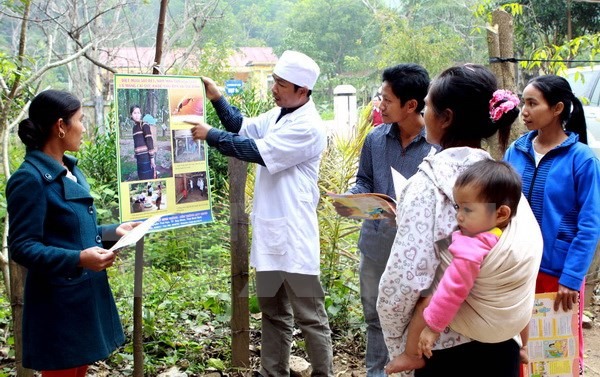 Society
Society

The malaria epidemic is facing a risk of a resurgence, with the drug's resistance to the world’s most effective antimalarial drug causing immense concern in Việt Nam’s health sector.
 |
| Health workers provide information about malaria to residents in Tuyên Hóa District in central Quảng Bình Province. – VNA/VNS Photo Dương Ngọc |
HÀ NỘI — The malaria epidemic is facing a risk of a resurgence, with the appearance of a parasite resistance to the world’s most effective antimalarial drug causing immense concern in Việt Nam’s health sector.
This was stated by the Ministry of Health’s National Institute of Malariology, Parasitology and Entomology.
Trần Thanh Dương, head of the institute, said although the number of newly-infected patients has declined, it still remains high due to a new drug-resistant parasite, which has caused difficulties in treatment.
In Việt Nam, more than 4,000 cases infected with malaria parasites were recorded in 2016, of which, three people died. The number of infected cases has reduced by 52.6 per cent compared with the previous year.
However, the number of malaria patients remains rather high, at some 30,000 annually.
In particular, the artemisinin-resistant Plasmodium falciparum parasite has surfaced in the five provinces of Quảng Nam, Khánh Hòa, Gia Lai, Đắk Nông and Bình Phước. There is danger of the parasite spreading to other provinces, causing an epidemic in the whole country.
The reason, Dương said, is that Việt Nam is a tropical country with favourable climatic conditions for mosquitoes carrying malaria and dengue fever diseases.
Dương said the control of mosquitoes spreading malaria, dengue fever and other infectious diseases remains difficult. Apart from climate change, the State budget for the disease has sharply decreased in recent years.
In addition, malaria control did not attract qualified staff due to low salaries.
Head of the ministry’s Department of Preventive Medicine Trần Đắc Phu said the control of malaria faces challenges due to low awareness among people and increase in the travel of Vietnamese labourers to malaria-infected areas in Africa and other Southeast Asia countries.
Phu said to eliminate the mosquito-borne disease by 2030, the health sector will increase dissemination of information on the disease and focus on monitoring the disease in key areas such as the Central Highland region and Bình Phước Province. — VNS




